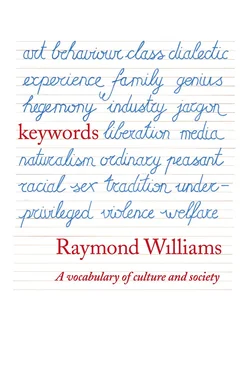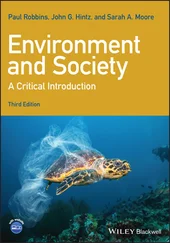Keywords
A vocabulary of culture and society
Raymond Williams
Fourth Estate • London
Title Page Keywords A vocabulary of culture and society Raymond Williams Fourth Estate • London
Introduction
Preface to the Second Edition
Abbreviations
A
AESTHETIC
ALIENATION
ANARCHISM
ANTHROPOLOGY
ART
B
BEHAVIOUR
BOURGEOIS
BUREAUCRACY
C
CAPITALISM
CAREER
CHARITY
CITY
CIVILIZATION
CLASS
COLLECTIVE
COMMERCIALISM
COMMON
COMMUNICATION
COMMUNISM
COMMUNITY
CONSENSUS
CONSUMER
CONVENTIONAL
COUNTRY
CREATIVE
CRITICISM
CULTURE
D
DEMOCRACY
DETERMINE
DEVELOPMENT
DIALECT
DIALECTIC
DOCTRINAIRE
DRAMATIC
E
ECOLOGY
EDUCATED
ELITE
EMPIRICAL
EQUALITY
ETHNIC
EVOLUTION
EXISTENTIAL
EXPERIENCE
EXPERT
EXPLOITATION
F
FOLK
FAMILY
FICTION
FORMALIST
G
GENERATION
GENETIC
GENIUS
H
HEGEMONY
HISTORY
HUMANITY
I
IDEALISM
IDEOLOGY
IMAGE
IMPERIALISM
IMPROVE
INDIVIDUAL
INDUSTRY
INSTITUTION
INTELLECTUAL
INTEREST
ISMS
J
JARGON
L
LABOUR
LIBERAL
LIBERATION
LITERATURE
M
MAN
MANAGEMENT
MASSES
MATERIALISM
MECHANICAL
MEDIA
MEDIATION
MEDIEVAL
MODERN
MONOPOLY
MYTH
N
NATIONALIST
NATIVE
NATURALISM
NATURE
O
ORDINARY
ORGANIC
ORIGINALITY
P
PEASANT
PERSONALITY
PHILOSOPHY
POPULAR
POSITIVIST
PRAGMATIC
PRIVATE
PROGRESSIVE
PSYCHOLOGICAL
R
RACIAL
RADICAL
RATIONAL
REACTIONARY
REALISM
REFORM
REGIONAL
REPRESENTATIVE
REVOLUTION
ROMANTIC
S
SCIENCE
SENSIBILITY
SEX
SOCIALIST
SOCIETY
SOCIOLOGY
STANDARDS
STATUS
STRUCTURAL
SUBJECTIVE
T
TASTE
TECHNOLOGY
THEORY
TRADITION
U
UNCONSCIOUS
UNDERPRIVILEGED
UNEMPLOYMENT
UTILITARIAN
V
VIOLENCE
W
WEALTH
WELFARE
WESTERN
WORK
References and Select Bibliography
About the Author
Copyright
About the Publisher
In 1945, after the ending of the wars with Germany and Japan, I was released from the Army to return to Cambridge. University term had already begun, and many relationships and groups had been formed. It was in any case strange to travel from an artillery regiment on the Kiel Canal to a Cambridge college. I had been away only four and a half years, but in the movements of war had lost touch with all my university friends. Then, after many strange days, I met a man I had worked with in the first year of the war, when the formations of the 1930s, though under pressure, were still active. He too had just come out of the Army. We talked eagerly, but not about the past. We were too much preoccupied with this new and strange world around us. Then we both said, in effect simultaneously: ‘the fact is, they just don’t speak the same language’.
It is a common phrase. It is often used between successive generations, and even between parents and children. I had used it myself, just six years earlier, when I had come to Cambridge from a working-class family in Wales. In many of the fields in which language is used it is of course not true. Within our common language, in a particular country, we can be conscious of social differences, or of differences of age, but in the main we use the same words for most everyday things and activities, though with obvious variations of rhythm and accent and tone. Some of the variable words, say lunch and supper and dinner , may be highlighted but the differences are not particularly important. When we come to say ‘we just don’t speak the same language’ we mean something more general: that we have different immediate values or different kinds of valuation, or that we are aware, often intangibly, of different formations and distributions of energy and interest. In such a case, each group is speaking its native language, but its uses are significantly different, and especially when strong feelings or important ideas are in question. No single group is ‘wrong’ by any linguistic criterion, though a temporarily dominant group may try to enforce its own uses as ‘correct’. What is really happening through these critical encounters, which may be very conscious or may be felt only as a certain strangeness and unease, is a process quite central in the development of a language when, in certain words, tones and rhythms, meanings are offered, felt for, tested, confirmed, asserted, qualified, changed. In some situations this is a very slow process indeed; it needs the passage of centuries to show itself actively, by results, at anything like its full weight. In other situations the process can be rapid, especially in certain key areas. In a large and active university, and in a period of change as important as a war, the process can seem unusually rapid and conscious.
Yet it had been, we both said, only four or five years. Could it really have changed that much? Searching for examples we found that some general attitudes in politics and religion had altered, and agreed that these were important changes. But I found myself preoccupied by a single word, culture , which it seemed I was hearing very much more often: not only, obviously, by comparison with the talk of an artillery regiment or of my own family, but by direct comparison within the university over just those few years. I had heard it previously in two senses: one at the fringes, in teashops and places like that, where it seemed the preferred word for a kind of social superiority, not in ideas or learning, and not only in money or position, but in a more intangible area, relating to behaviour; yet also, secondly, among my own friends, where it was an active word for writing poems and novels, making films and paintings, working in theatres. What I was now hearing were two different senses, which I could not really get clear: first, in the study of literature, a use of the word to indicate, powerfully but not explicitly, some central formation of values (and literature itself had the same kind of emphasis); secondly, in more general discussion, but with what seemed to me very different implications, a use which made it almost equivalent to society : a particular way of life – ‘American culture’, ‘Japanese culture’.
Читать дальше












